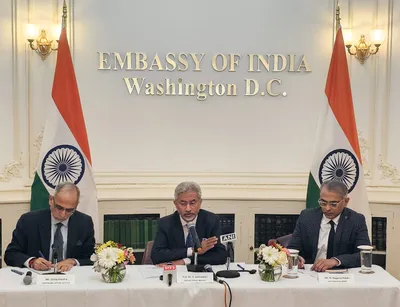India’s Migration Policy and Global Engagement: India is actively promoting legal migration and reintegrating its illegally residing nationals into its national economy for national growth and international collaboration

Quick Overview
India is actively advocating for greater legal migration and is taking a firm stance on accepting deported nationals, as articulated by External Affairs Minister S. Jaishankar during his recent visit to the US. This approach reflects India’s desire to leverage its vast skilled workforce and the influence of its significant diaspora, which plays a crucial role in the country’s economy through remittances.
Key Points
- India emphasizes the importance of legal migration and is open to the return of its nationals living illegally abroad.
- In 2023, India received $125 billion in remittances, significantly surpassing the $71.92 billion in foreign direct investment (FDI).
- The Indian diaspora, numbering approximately 35 million, contributes to India’s global standing and economic strength.
- India has signed various migration and labor agreements with multiple countries to facilitate legal mobility and combat irregular migration.
- Jaishankar raised concerns about prolonged visa processing times, which hinder business and tourism relations.
Detailed Breakdown
Advocacy for Legal Migration
During a press briefing in Washington, Jaishankar reiterated India’s commitment to legal migration, stating that the country is open to the return of Indian nationals who are living illegally abroad. He emphasized that India’s position is consistent and principled, opposing illegal migration due to its association with unlawful activities.
Economic Impact of Remittances
India’s economy benefits significantly from remittances, with $125 billion sent back home by expatriate workers in 2023. This amount is crucial as it far exceeds the foreign direct investment received, showcasing the financial importance of the Indian diaspora. The primary sources of these remittances include the US, UAE, Saudi Arabia, and the UK.
Diaspora Influence
The Indian diaspora plays a vital role in enhancing India’s global influence. Notable figures of Indian origin, such as Sundar Pichai (CEO of Alphabet) and Satya Nadella (CEO of Microsoft), highlight the contributions of Indian immigrants to various sectors. This presence in Fortune 500 companies underscores the potential for India to harness its talent pool for further economic and diplomatic gains.
Bilateral Agreements
To promote legal migration, India has established several migration and labor agreements. These include Labour Manpower Agreements with Gulf countries and Jordan, as well as Migration and Mobility Partnership Agreements (MMPAs) with countries like France, the UK, and Germany. These agreements facilitate short-stay visas and mobility for students and professionals, while also addressing issues of irregular migration and human trafficking.
Challenges with Visa Delays
Jaishankar addressed the issue of lengthy visa processing times, stating that delays can adversely affect business and tourism, ultimately impacting the overall relationship between India and the US. He highlighted that a visa application process taking around 400 days does not serve the interests of either nation.
Important Details & Evidence
- Remittances: $125 billion received in 2023, exceeding FDI of $71.92 billion.
- Diaspora Size: Approximately 35 million Indians living abroad.
- Key Figures: Sundar Pichai, Satya Nadella, Ajay Banga, and Gita Gopinath are notable leaders of Indian origin in major corporations and financial institutions.
Final Takeaways
India’s proactive stance on legal migration and its efforts to engage with its diaspora reflect a strategic approach to enhance its global standing. By fostering legal pathways for migration and addressing visa processing challenges, India aims to maximize the benefits of its skilled workforce while maintaining a principled position against illegal migration. The significant remittances from the diaspora further illustrate the economic importance of these initiatives, making it clear that India is committed to leveraging its global talent for national growth and international collaboration.